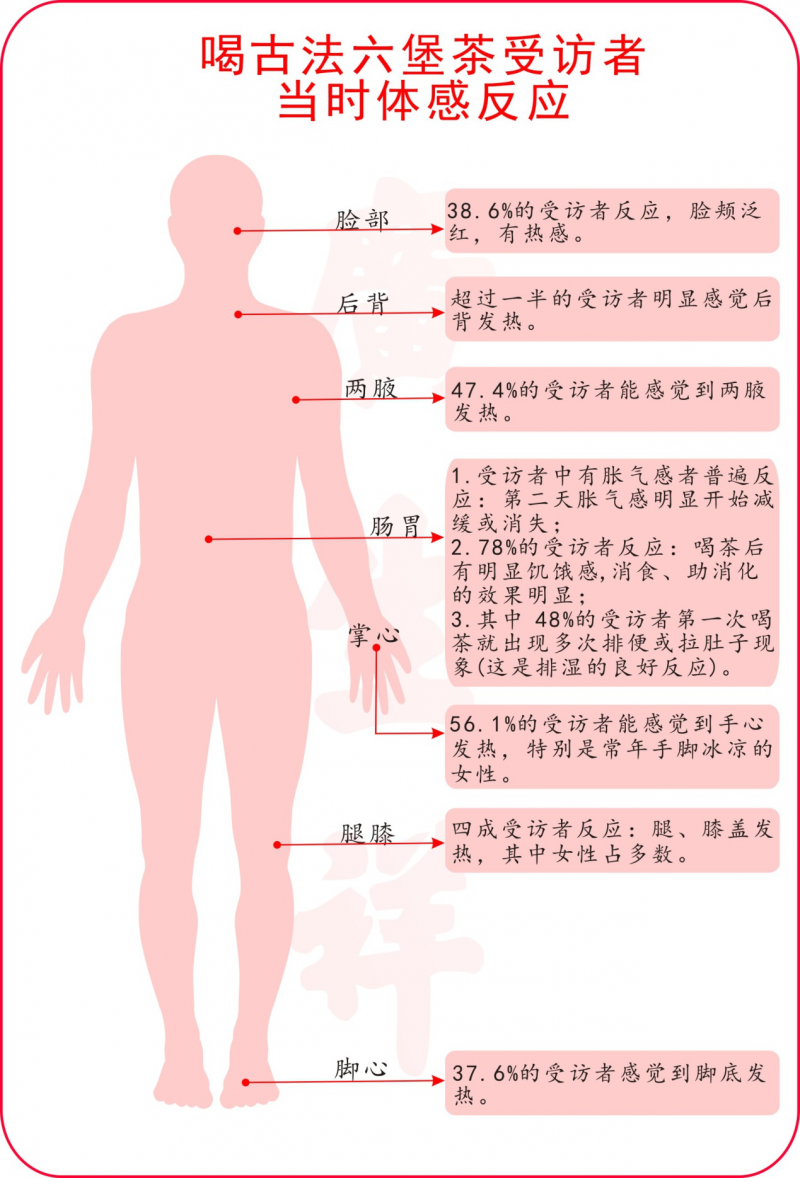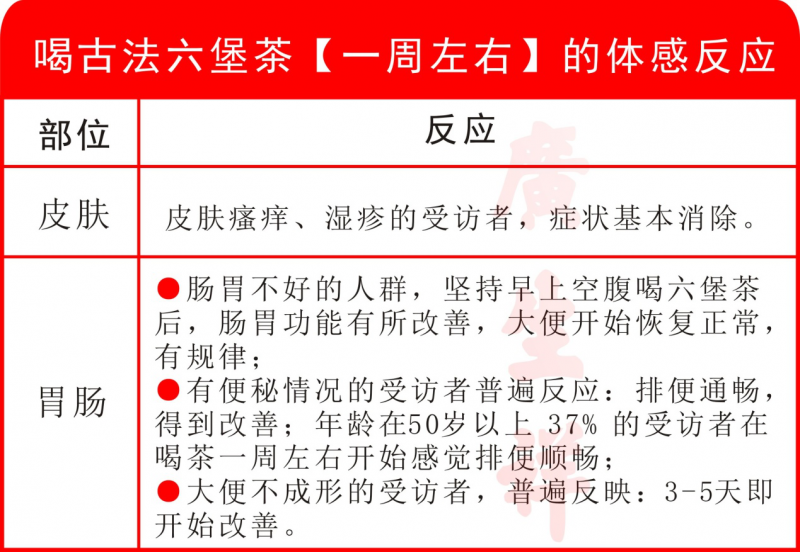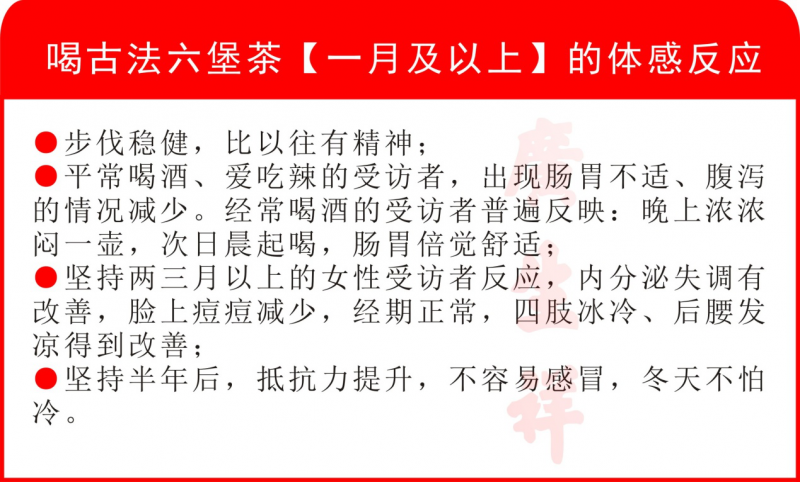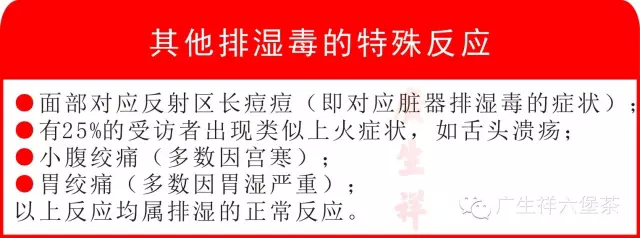A year has four seasons: spring, summer, autumn, and winter; a day has four periods: morning, noon, dusk, and night; people have four qi: cold, cool, warm, and hot; tea also has four natures: cold, cool, warm, and hot.
Currently, we still advocate drinking tea that suits one's constitution and satisfies one's taste. While enjoying the pleasure of tea, one should also carefully observe the physical sensations it brings.
Over the years, we have repeatedly raised the question, 'Drink for taste or drink for bodily sensation?' to remind consumers and tea enthusiasts to pay attention to their physical reactions after drinking traditional Liubao tea. In 2015, we conducted a survey on the physical reactions to traditional Liubao tea's dampness-dispelling and stomach-regulating effects, aiming to address public doubts about its efficacy and invite more people to try it!
Immediate Physical Reactions

Four-Flavor Scholar repeatedly emphasizes that the strong tea energy of traditional Liubao tea is closely related to its fermentation process. The key steps in traditional Liubao tea fermentation are '罨' (yǎn), '蒸' (steaming), and '焗' (stewing).
罨, pronounced 'yǎn' in Mandarin and 'and;p' in Cantonese. 罨堆 refers to fermenting tea leaves directly after rolling.
Process advantages: This process is closely related to the tea's later transformation, taste, and bodily sensations. The repeated stacking, steaming, and stewing, along with alternating cooling and heating, promote multiple enzymatic and hydrothermal reactions, enriching microbial flora and enhancing post-fermentation potential and layered flavors. The conversion of tea polyphenols, catechins, flavonoids, etc., is more thorough, resulting in strong tea energy and better dampness-dispelling and stomach-regulating effects.
Consistently drinking for about a week
'Busyness' seems to be the label of this era. We might as well follow the ancients' example by steeping tea in a thermos, brewing it in a large pot, or simply soaking it in a big cup. Whether traveling, working in the office, or on a picnic, it's convenient and simple.
Among these methods, Four-Flavor Scholar most recommends steeping in a thermos. This method not only allows for hearty drinking but also enhances the dampness-dispelling and stomach-regulating effects.

Physical Reactions After Consistent Consumption for a Month or More

Special Physical Reactions

Appendix: Facial Reflection Diagram

Dialogue with Four-Flavor Scholar
Q: Why do I experience insomnia after drinking your traditional rich and mellow Liubao tea?
Four-Flavor Scholar: Traditional rich and mellow Liubao tea, with its repeated steaming and stewing fermentation, has a calming effect. However, individual differences may cause insomnia in some tea drinkers.
For example, traditional Chinese medicine describes a condition called '心气内洞' (internal emptiness of heart qi). What is '心气内洞'? To put it simply, the 'heart' should be 'steadily placed,' but due to individual reasons such as 'shock,' 'fear,' or 'emotion' (note these characters all have a vertical heart radical, indicating the 'heart' is 'standing up'), the heart becomes unsettled, leading to '心气内洞' or '出神' (distraction). Specific symptoms include hearing sounds from far away at night, feeling unusually irritated by normal noises in public, or overreacting to unfamiliar activities.
One can try traditional Chinese medicine to treat the spleen, stomach, or calm the mind while continuing to drink traditional rich and mellow Liubao tea to regulate the meridians and stomach.
Q: Why does my throat feel dry after drinking any of your four-flavor traditional teas?
Four-Flavor Scholar: This is often related to excessive heat in the lower burner and damp-heat in the body. People with this condition usually feel a dry throat after drinking any tea.
The torso is divided into three parts: the upper burner (above the diaphragm, including the heart and lungs), the middle burner (below the diaphragm to the navel, including the spleen, stomach, liver, and gallbladder), and the lower burner (below the navel, including the kidneys, large intestine, small intestine, and bladder).
In the past, northern winters were dominated by cold syndromes, but now dry syndromes are more common due to high indoor temperatures and modern dietary habits, leading to excessive heat in the lower burner.
One can try steeping Ophiopogon japonicus in hot water and drinking it while also consuming traditional Liubao tea to help dispel dampness.
Q: Why do I urinate noticeably less after drinking traditional Liubao tea compared to other teas?
Four-Flavor Scholar: The caffeine in tea has stimulating and diuretic effects. The so-called 'tea flush,' where one urinates continuously, is due to caffeine.
The fermentation process of traditional Liubao tea, involving '罨,' '蒸,' and '焗,' gives it strong tea energy, promoting meridian circulation. More of the tea's substances are directly absorbed by the body. Additionally, this repeated fermentation converts most of the caffeine into other compounds. Thus, drinking the same amount of tea in the same time frame, one will urinate noticeably less after drinking traditional Liubao tea compared to other teas.
A reminder: If 'tea flush' occurs, one should drink plain water promptly to replenish bodily fluids, as excessive diuresis can dehydrate the body.
Q: Why do I feel dizzy and bloated after drinking your traditional Liubao tea?
Four-Flavor Scholar: Such individuals often have气虚 (qi deficiency) and blocked governing vessels. Traditional Liubao tea has strong tea energy that enters the kidney meridian and governs the governing vessel.
The governing vessel starts in the lower abdomen, exits at the perineum, runs along the spine to the top of the head, and descends to the nose and upper teeth. If the governing vessel is blocked between the大椎穴 (Dazhui point) and龈交穴 (Yinjiao point), dizziness and bloating may occur, especially around the temples or eye sockets. Those experiencing this should reduce tea intake and persist in drinking until the governing vessel clears, after which the symptoms will disappear.
Q: Can overnight tea be drunk? Can tea be drunk on an empty stomach? Can strong tea be drunk?
Four-Flavor Scholar: The old saying 'overnight tea cannot be drunk,' 'tea cannot be drunk on an empty stomach,' and 'strong tea cannot be drunk' refers to cold-natured teas like green tea. Drinking such teas overnight makes them 'even colder,' potentially causing stomach discomfort or diarrhea. Drinking them on an empty stomach or too strong may also upset the stomach, especially for those with weak or cold constitutions.
Liubao tea, with its neutral nature, strengthens the spleen, dispels dampness, and regulates the stomach. It can be drunk overnight, on an empty stomach, or strong. A pot of strong Liubao tea is especially suitable for those with heavy dampness, stomach discomfort, poor detoxification, or indigestion.
Q: Can pregnant women and children drink Liubao tea?
Four-Flavor Scholar: Liubao tea has a neutral nature and is post-fermented, calming the mind. Pregnant women and children can drink it in moderation. Children can enjoy it as a flavored drink: add milk and sugar (or honey) to brewed tea for a pleasant taste.
However, physically weak pregnant women, especially in early pregnancy, should avoid it, as tea energy may descend, and they need to stabilize the fetus.
Q: Can tea be drunk while taking medicine?
Four-Flavor Scholar: It's best to wait two hours.
Q: Why should women avoid tea during their special monthly days?
Four-Flavor Scholar: All teas have tea energy, which tends to descend, making it unsuitable during this time.
Tea is a benevolent substance, and we dare not misrepresent or promote it falsely. Discussing Liubao tea fills us with trepidation, fearing even slight errors that may add to our karmic burdens! We bow in gratitude to those who point out mistakes to help us atone.
—Four-Flavor Scholar